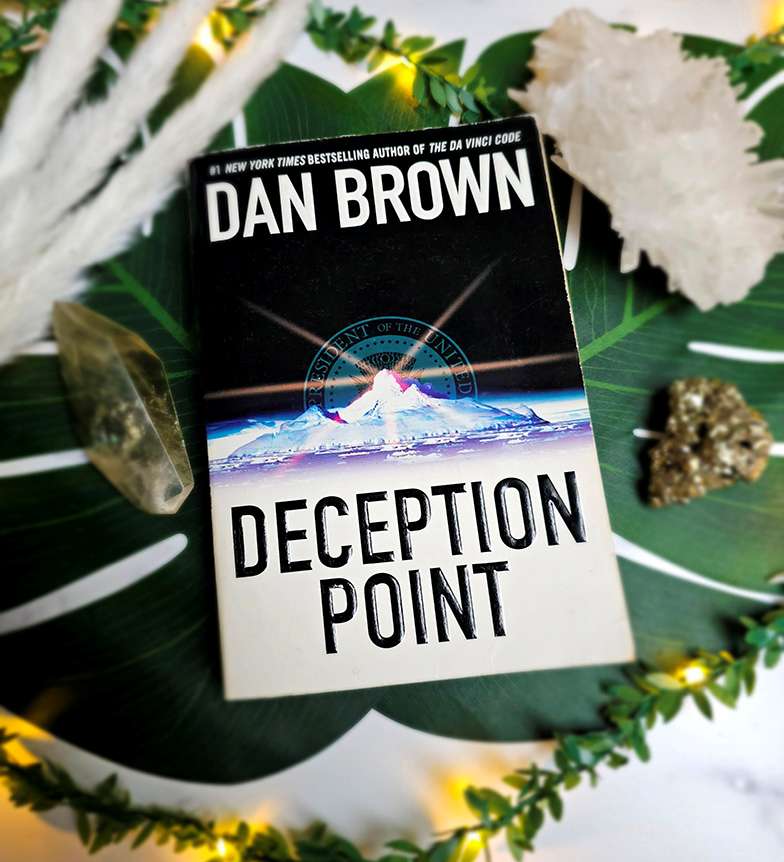
Deception Point
by Dan Brown
A high-stakes thriller involving a NASA discovery in the Arctic that could change everything, if the political conspiracy surrounding it doesn't destroy it first.
Spoiler Warning
This review may contain spoilers. Read at your own discretion if you haven't finished the book yet.
Science, Politics, and Deadly Deception in the Arctic
Deception Point showcases Dan Brown at his most ambitious, weaving together cutting-edge science, political conspiracy, and survival thriller elements into a complex narrative that spans from the frozen Arctic to the halls of Washington D.C. While perhaps not as polished as his later Robert Langdon series, this standalone novel demonstrates Brown's ability to blend real scientific concepts with pulse-pounding fiction.
The Setup: Discovery and Doubt
The novel opens with what appears to be the scientific discovery of the century: a meteorite embedded in the Arctic ice containing fossils that could prove extraterrestrial life exists. For NASA, struggling with budget cuts and public skepticism, this discovery represents salvation. For presidential candidate Senator Sedgewick Sexton, who has built his campaign on attacking NASA's spending, it's a potential disaster.
When intelligence analyst Rachel Sexton - daughter of the senator and employee of the National Reconnaissance Office - is sent to verify the discovery's authenticity, she becomes entangled in a web of deception that threatens not only the presidential election but her own survival.
Brown's Scientific Foundation
Real Science as Bedrock
One of Deception Point's greatest strengths is Brown's commitment to scientific accuracy in his foundational elements. The meteorite analysis, ice core sampling, and space technology described in the novel are grounded in real scientific principles. Brown clearly researched extensively, and it shows in the technical details that give weight to the fantastic elements of the plot.
The Aurora Borealis and Arctic Environment
The Arctic setting isn't just backdrop - it becomes integral to the story's tension and authenticity. Brown's descriptions of the harsh environment, the effects of extreme cold on equipment and human physiology, and the isolation of the research station create natural obstacles that heighten every scene.
Technology as Character
From NASA satellites to advanced underwater vehicles, technology plays a crucial role throughout the novel. Brown presents these tools realistically, showing both their capabilities and limitations, which adds credibility to the action sequences.
Political Intrigue and Institutional Critique
NASA Under Siege
The novel presents a nuanced view of NASA during a period of public skepticism and budget constraints. Brown explores the pressure on scientific institutions to produce results that justify their funding, creating moral ambiguity around the meteorite discovery that goes beyond simple good-versus-evil dynamics.
Campaign Politics
The presidential campaign subplot provides insight into modern political machinery, from opposition research to media manipulation. Senator Sexton's character embodies the political opportunist willing to exploit scientific ignorance for electoral gain.
Government Agencies in Conflict
The tension between different government agencies - NASA, NRO, and various intelligence services - reflects real institutional rivalries and competing interests within the federal government.
Character Development and Relationships
Rachel Sexton: Torn Loyalties
Rachel serves as an effective protagonist, caught between loyalty to her father and her professional integrity. Her expertise in intelligence analysis makes her a credible character to uncover the conspiracy, while her personal stakes add emotional weight to the plot.
Michael Tolland: Science Under Pressure
The oceanographer Michael Tolland represents the scientist caught between truth and institutional pressure. His relationship with Rachel develops naturally within the constraints of the thriller format, providing personal stakes without overwhelming the plot.
The Supporting Cast
From the mysterious "controller" directing the conspiracy to the Delta Force operatives carrying out deadly orders, Brown populates his story with characters who feel like real people with understandable motivations, even when those motivations are corrupt.
Strengths of the Novel
Pacing and Structure
Brown masterfully alternates between different locations and perspectives, maintaining momentum while providing necessary exposition. The countdown structure of many chapters adds urgency without feeling forced.
Educational Value
Readers genuinely learn about meteorites, ice physics, oceanography, and space technology while being entertained. Brown's ability to make complex scientific concepts accessible is on full display.
Plausible Conspiracy
The central conspiracy feels believable because it's rooted in institutional pressures and human weaknesses rather than cartoonish villainy. The motivations behind the deception are understandable, even if the methods are extreme.
Action Sequences
The survival sequences in the Arctic, underwater escapes, and chase scenes are well-choreographed and maintain tension without stretching credibility too far.
Areas for Improvement
Character Depth
While functional, most characters serve primarily as plot devices rather than fully realized individuals. The romantic subplot, while not intrusive, feels somewhat obligatory.
Predictable Elements
Experienced thriller readers may guess some plot twists in advance, particularly regarding the identity of certain antagonists.
Length and Pacing Issues
Some technical expositions, while fascinating, occasionally slow the narrative momentum. The novel might have benefited from tighter editing in certain sections.
Thematic Resonance
Truth vs. Institutional Interest
The novel explores how scientific truth can be subordinated to institutional needs, whether political, financial, or bureaucratic. This theme feels particularly relevant in an era of increasing skepticism toward scientific institutions.
Media Manipulation
Brown effectively demonstrates how scientific discoveries can be spun for political purposes and how public understanding of science can be manipulated by those with agendas.
Environmental Consciousness
The Arctic setting naturally raises environmental themes, particularly regarding climate change and humanity's impact on pristine wilderness areas.
Comparison to Brown's Other Works
Deception Point lacks some of the historical depth and symbolic complexity of the Robert Langdon novels, but it compensates with more realistic contemporary settings and scientific grounding. Readers who prefer Brown's conspiracy elements over his historical puzzles may find this novel more satisfying.
Cultural and Scientific Relevance
The novel's themes about scientific integrity, institutional corruption, and media manipulation have only become more relevant since its publication. Current debates about scientific funding, climate change denial, and the politicization of scientific research give the book added resonance.
Who Should Read It
This book is ideal for:
- Dan Brown fans seeking his signature blend of conspiracy and real-world detail
- Readers interested in scientific thrillers grounded in actual research
- Anyone fascinated by space exploration, oceanography, or Arctic environments
- Thriller enthusiasts who enjoy political intrigue alongside action sequences
Consider skipping if you prefer character-driven narratives over plot-driven ones, or if extensive technical exposition tends to bore you.
Final Assessment
Deception Point succeeds as both entertainment and education, offering a thrilling ride through contemporary scientific and political landscapes. While it may not reach the heights of Brown's most famous works, it demonstrates his ability to make complex subjects accessible while maintaining the page-turning momentum that defines great thriller writing.
The novel's greatest achievement is making readers think critically about the intersection of science and politics while delivering genuine surprises and heart-pounding action. In an age where scientific literacy and institutional trust are increasingly important, Brown's exploration of these themes feels both timely and necessary.
Rating: 5.0/5 ⭐
Perfect for: Science thriller enthusiasts, Dan Brown fans, readers interested in political conspiracy fiction
Consider carefully if: You prefer character studies over plot-driven narratives, or extensive technical detail doesn't appeal to you
You Might Also Like

The Black Book
by James Patterson & David Ellis
Detective Billy Harney's life is turned upside down when he's framed for a murder he didn't commit, forcing him to navigate a web of corruption within his own police department.

The Girl in the Spider's Web
by David Lagercrantz
The continuation of Stieg Larsson's Millennium series, bringing back Lisbeth Salander and Mikael Blomkvist in a new high-stakes thriller involving NSA surveillance and artificial intelligence.

Champion
by Marie Lu
The epic conclusion to the Legend trilogy, where Day and June must put aside their differences to save both the Republic and the Colonies from a deadly plague.